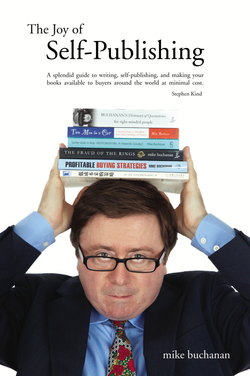Читать книгу The Joy of Self-Publishing - Mike MD Buchanan - Страница 10
На сайте Литреса книга снята с продажи.
2| THE WRITER’S DELUSION AND ITS EXPLOITATION BY SOME PUBLISHERS
Оглавлениеdelusion n the state of being deluded; a false belief (esp psychol); error.
exploitation n the act of using for selfish purposes.
This chapter covers:
-vanity publishers
-the writer’s delusion
-publishing packages
-sales rankings
-0 per cent cholesterol margarine
-retaining copyright
Let’s start with a definition of the term ‘vanity publisher’. Many of the publishers seeking your custom will go to great lengths to distance themselves from the term ‘vanity publisher’. Ask yourself one simple question, ‘Will I have to pay this company to have my book produced and distributed?’ If the answer is ‘Yes’ the company is a vanity publisher. It’s not rocket science.
The publisher’s input can be small or large. The publishing elements – whether or not bundled up in ‘publishing packages’ – may be priced modestly or extravagantly. I have no objection to vanity publishers in principle. What I do object to is the marketing hype which leads aspiring authors to believe their books will have a significant chance of being commercially successful. The reality is that the prospect of commercial success for a new writer’s books, regardless of how good a writer he is, and regardless of how expensive a publishing package he is willing to buy, is small. If the author believes otherwise, he is almost certainly deluded. Vanity publishers survive by exploiting that delusion.
Some of the vanity publishers’ websites are as interesting for what they don’t tell aspiring writers as for what they do. You could be forgiven for thinking that as a self-publisher you won’t be able to obtain ISBNs for your books, or retain copyright. Vanity publishers don’t say these things, of course. They subtly lead you to draw such false conclusions.
In July 2010 I was conducting a survey of the vanity publishers’ websites. I planned to compare the various offerings as far as it was possible to do so, with a view to presenting you with some comparative information.
Some of the companies appeared professional; some didn’t. Some had clear contract terms; some didn’t. Some had clear pricing structures; some didn’t. One major publisher had a pricing structure for books which would have baffled an accountant. I was used to understanding complex pricing structures – I’d been doing so for the previous 25 years in my working life – but after an hour I had to give up the challenge of determining what my book would cost if published by them. Anyway, the service seemed squarely aimed at attractive authors in their early 20s, as far as I could tell. They presumably spent hours in the publisher’s online forums telling one another how amazing each other’s books are.
I reviewed the website of a large vanity publisher which offered publishing packages, some of them for eye-watering sums: up to £11,000. As you’ll find with many companies offering such services, their website had testimonials from satisfied writers. I thought I’d investigate how well the books in question were selling by looking at their sales rankings on Amazon.com. The books were all published in America between 2004 and 2009. The highest-selling title ranked at 2,278,217. The lowest-selling title ranked at a jaw-dropping 7,883,223.
And so it was that that I decided to discard all the comparative information I’d drawn up on vanity publishers. It seemed to me that compared with the self-publishing model I shall be presenting to you, these companies were offering models which delivered books more expensively, with a poorer range of specifications, and with less creative control for you, the writer. All too often vanity publishers offer packages which exploit writers’ – and especially new writers’ – lack of knowledge of the options available to them. They are trying to sell you a dream.
If you look at these companies’ websites through a businessperson’s eyes – as I have – you see marketing hype running through so much of what they assert. I was reminded at one point of the British food manufacturer which was selling margarine and making a great play on the claim of ‘0 per cent cholesterol’ in the product. Well, no margarine has ever contained cholesterol, but ‘0 per cent cholesterol’ might lead you to think otherwise.
What reminded me of the margarine case was a point made on a number of the publishers’ websites: that you would retain copyright of your work if you published through them. The inference was that if you went to other publishers you would lose it – and to be fair, with some of them, you would. But – in the UK at least – copyright is automatic, and if you contract directly with a printer, as I shall be recommending in Chapter 4, you will certainly retain copyright.
